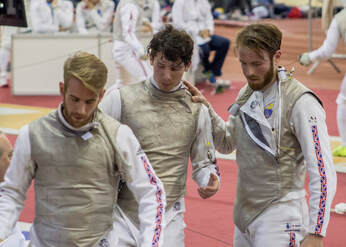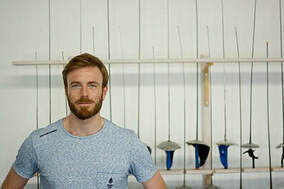|
By Laurence Halsted, two-time Olympic fencer, current Performance Director at Danish Fencing, and Co-Director of The True Athlete Project's Global Mentoring Program. I have previously written a mini-series on the role of self-compassion in sport, a skill that is sorely needed when athletes are so often their own harshest critics, beating themselves up for making mistakes and consequently suffering far more than necessary. You can read the first article in that series here. I would like to address another common concern, particularly amongst young athletes. It’s a phenomenon you’ll see playing out in tournaments and practices in every sport, in every country. It may be quite hard to notice at first, but coaches and spectators will soon pick up on it. The athlete they’re watching just doesn’t seem to be giving their fullest effort. It’s not that they’re being outplayed; it’s not that they’re making mistakes; it seems as if they’re purposefully holding back. They’re losing without ever really trying. Understandably, this can be incredibly frustrating to witness from the sidelines. What can possibly be going on? How can an otherwise motivated, ambitious athlete put in a thoroughly sub-standard performance and even lose a match, without having once tried to find a higher gear? The heart of the issue, I propose, is vulnerability. And the answer to this conundrum may be found by unravelling the monumental misconceptions that our culture maintains around this word. So first, what exactly is vulnerability and what is it not? Traditionally, we equate vulnerability with weakness. We imagine an animal vulnerable to attack, and therefore open to being wounded. But whilst it is true that being vulnerable involves a certain kind of openness, physically or more often psychologically, it doesn’t follow that vulnerability is equal to weakness. In fact, embracing vulnerability shows inner strength and integrity. It is courage, it is being brave. This is the misconception that we must address in our culture as a whole but especially in sports’ culture, if we are to unleash more of our athletes’ potential. Let’s unpack the contradiction. Superstar vulnerability researcher, Brené Brown (see her blockbusting TED Talk from 2010), describes vulnerability as the feeling we get during times of uncertainty, risk, or emotional exposure. If you consider a performance of any kind — sport, art, business – each one involves one or more of these elements. Indeed all sporting performances inherently involve uncertainty, as the result is, by definition, unknown. This uncertainty in turn often produces a sense of emotional exposure for the participants who care deeply about that result. And emotional exposure then represents a risk to the ego, as it faces the potential backlash from mistakes or failure. Now consider the athlete in question, holding back from giving their all in a match. In light of this description of vulnerability, it begins to make perfect sense. The ego is trying to protect itself from the risk of an uncertain, emotionally charged situation. If the athlete were to give absolutely everything to the performance and still lose or make mistakes, the emotional backlash could be severe. So instead they protect themselves by not really trying and therefore not putting any significant part of themselves on the line. Justifications after the fact often follow: "I just didn’t care enough" or "I could see straight away I wasn’t going to win" or "I couldn’t find the motivation to work hard". These post-rationalisations, often unconscious, cover over the fact that the athlete simply was not willing to put themselves out there, not willing to be vulnerable. And this is the key point: in order to perform at their best, athletes must embrace vulnerability. They must feel the uncertainty, the risk, of putting their emotions on the line and go out and give everything they have anyway. This is the definition of courage. In fact, courage is not the absence of fear – it is feeling afraid and doing the job anyway! Everyone wants to be courageous, but few make the connection that to be courageous requires you to be vulnerable first. I would say that most young athletes have not fully understood or embraced that connection. So here is the contradiction laid bare: everyone wants to be courageous but no one wants to be vulnerable. One does not come without the other, so athletes who want to reach their potential and meet pressure with courage must be prepared to seek out and embrace moments of vulnerability. Without an understanding of the reality of vulnerability and courage, an athlete will forever be at the mercy of their changing mood and state of mind. Sometimes they will feel confident and able to risk more, and sometimes their ego will recoil from exposure and require greater self-protection. It might seem strange but we should be teaching young athletes how to be courageous. They must understand that it’s not a question about being brave or afraid but that bravery is about feeling afraid, accepting that feeling and moving forward anyway. We need to build awareness around feeling uncomfortable during a performance. Everyone has heard the message about “getting out of your comfort zone” in order to make gains and develop; feeling uncomfortable in a situation is also a prerequisite for being courageous. We can aim to train an action trigger in athletes around that feeling of discomfort. So when the ego has noticed that there is a lot at stake and wants to put up a protective barrier, such as withholding effort, the athlete would instead be cued to see it as an opportunity for courage and step up their efforts. All too often this moment of discomfort goes unnoticed for what it truly is – an essential milestone for peak performance – and the reaction is hijacked by unwanted subconscious forces. Embracing vulnerability offers profound benefits beyond sporting performance, too. Brené Brown identifies vulnerability as the foundation of empathy, creativity, belonging and love. Certainly, if you cannot open yourself up to others, then love and belonging will elude you, and if you are not willing to risk failing then there is no hope of innovation or creativity. As Brown puts it, "If we want greater clarity in our purpose, or deeper and more meaningful lives, vulnerability is the path." When asked to finish the sentence "vulnerability is…", people tend to expose how critical the concept is. How central it is to our so many of our most valuable emotions. Here are some classic responses: Vulnerability is… ● Standing up for myself ● Trying something new ● Asking for help ● Saying no ● Starting my own business ● Sharing something I wrote publicly ● Falling in love ● Saying "I love you" first ● Being accountable ● Asking for forgiveness ● Helping my wife with terminal cancer write her Will These responses could just as well be examples of courage. They show that vulnerability is implicit in taking responsibility, being honest, opening yourself up for great potential loss or gain, showing humanity. If the armour is up and you are protecting yourself from that uncomfortable, vulnerable feeling then all of this is off the table to you. Vulnerability is an area we all could benefit from understanding a little better. If we did, we could make far more of our individual and shared potential.  I’ll end with this. The title of Brené Brown’s book on the subject, Daring Greatly, comes from a legendary address by Theodore Roosevelt. This excerpt powerfully illustrates the uncertainty, risk and exposure that is at the heart of leading a life of meaning and courage. "It is not the critic who counts; not the man who points out how the strong man stumbles, or where the doer of deeds could have done them better. The credit belongs to the man who is actually in the arena, whose face is marred by dust and sweat and blood; who strives valiantly; who errs, who comes short again and again, because there is no effort without error and shortcoming; but who does actually strive to do the deeds; who knows great enthusiasms, the great devotions; who spends himself in a worthy cause; who at the best knows in the end the triumph of high achievement, and who at the worst, if he fails, at least fails while daring greatly, so that his place shall never be with those cold and timid souls who neither know victory nor defeat." The Man in the Arena- April 23, 1910  Laurence Halsted is the co-director of The True Athlete Project's Global Mentoring Program. He was a foil fencer who won a silver medallist in the 2008 European Championships and represented Great Britain at the 2012 and 2016 Olympic Games. He is the director of performance at Danish Fencing and has written for The Guardian and The Nation on athlete activism. Read Laurence's "Of course Trump attacks LeBron"
29 Comments
|
AuthorInsightful contributions by our expert team and guest contributors! Archives
July 2020
Categories |
|
The True Athlete Project is formed of two independent legal entities: The True Athlete Project (US), which is a 501(c)(3) nonprofit organisation under US federal tax guidelines, and The True Athlete Project Ltd (UK), which is a UK charity, registration number: 1198569.
The UK entity and the US entity serve to strengthen one another but have distinct strategies and are independent of one another. The True Athlete Project (US): Tax ID: 81-1063080 The True Athlete Project Ltd. Companies House No: 12416150 © Copyright 2024. The True Athlete Project. All rights reserved. |

 RSS Feed
RSS Feed